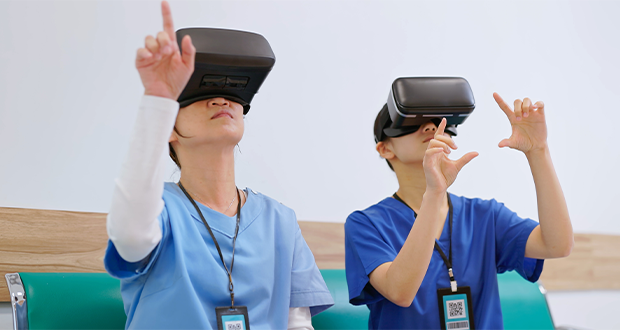Free training to deescalate dementia-related emergencies

Dementia Australia has launched a new virtual reality (VR) training workshop to help de-escalate behavioural emergencies in care settings.
D-Esc is an immersive simulation that aims to equip frontline and healthcare workers with essential skills and build empathy and understanding towards people with dementia.
Dementia Australia executive director Dr Kaele Stokes said the new workshop will provide training integral to the workforce's safety and professional development whilst improving the care people with dementia receive.
"Behavioural emergencies and occupational violence in aged care are time-critical emergencies," Dr Stokes said.
"We know that dementia can change people's behaviour – people living with dementia may feel anxious, fearful, distressed, confused and may also be in pain or disoriented.
"Sometimes, the way they are experiencing a situation may mean a person is unable to communicate how they feel or what they are experiencing. Additionally, the way a care worker communicates is vital – communication is not just talking."
Dr Stokes said gestures, movement, facial expressions, body language, and physical contact convey meaning and become significant when speech is difficult for people with dementia.
"Course participants will build their empathy, increase their understanding of dementia and skills in communication, recognising emotional and physical signs of escalation and how to reduce the risk of harm for both the person with dementia, other residents, visitors, and staff."
"D-Esc leverages technology to build participants' confidence and capability to assess and respond effectively to changed behaviours safely."
More than 400,000 Australians live with dementia, with 70 per cent of aged-care residents living with moderate to severe cognitive impairments, including dementia.
That number is estimated to jump to 900,000 in the next 25 years, with the recent Intergenerational Report estimating Australia's older population to triple.
New data by Dementia Australia estimates 812,500 by 2054 if there is no medical breakthrough.
Dementia advocate Phil Hazell lives with younger onset dementia and believes training like D-Esc is important for promoting awareness around dementia.
"I like to know that I am understood," Mr Hazell said.
"It is important that people comprehend what dementia is and how it can affect people differently.
"Training can help workers to understand, approach and help people living with dementia, without making assumptions."
With the support of Dementia Australia and the Australian Government, D-Esc workshops will be available free to 6500 eligible participants until June 30 2025.
To confirm eligibility visit: dementia.org.au/d-esc
Email: [email protected]





